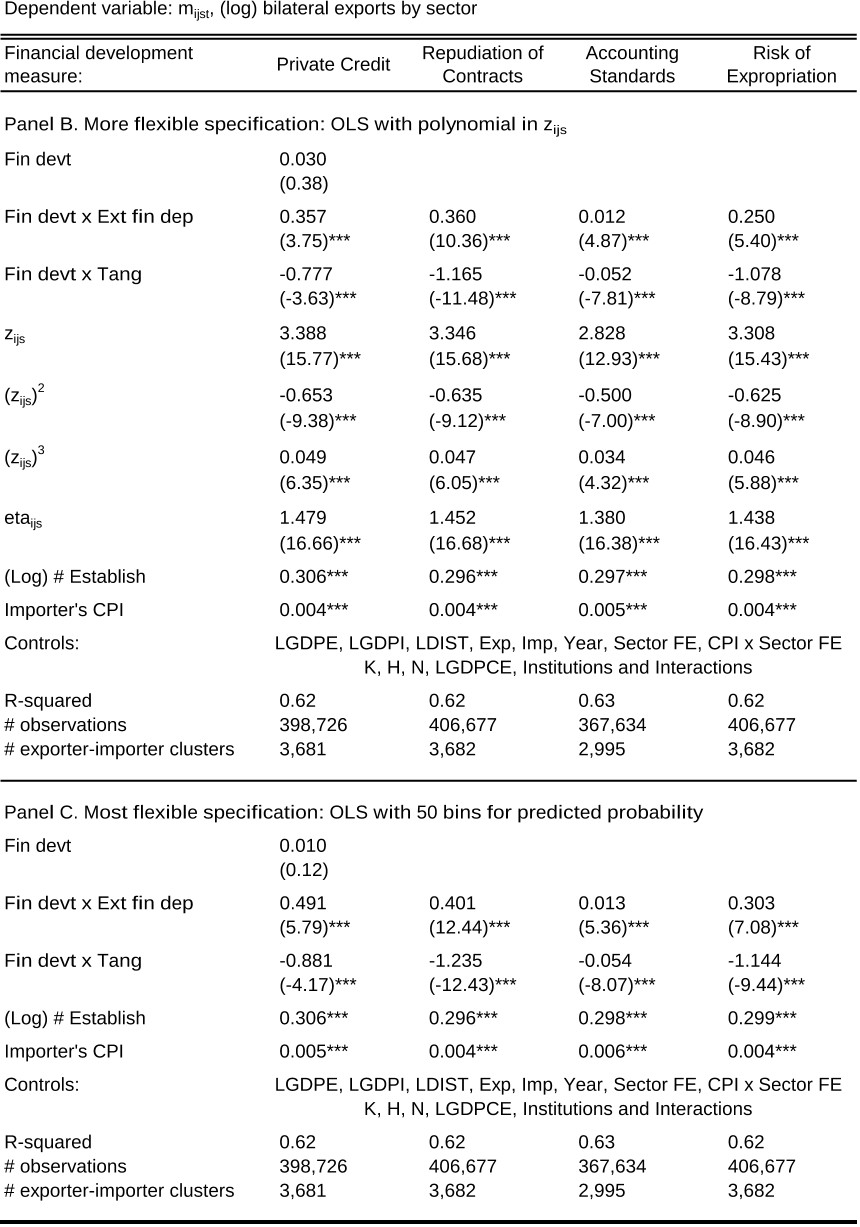Credit Constraints, Heterogeneous Firms and International Trade
Reads0
Chats0
TLDR
This article examined the detrimental consequences of financial market imperfections for international trade and developed a heterogeneous-firm model with countries at different levels of financial development and sectors of varying financial vulnerability.Abstract:
This paper examines the detrimental consequences of financial market imperfections for international trade. I develop a heterogeneous-firm model with countries at different levels of financial development and sectors of varying financial vulnerability. Applying this model to aggregate trade data, I study the mechanisms through which credit constraints operate. First, financial development increases countries' exports above and beyond its impact on overall production. Firm selection into exporting accounts for a third of the trade-specific effect, while two thirds are due to reductions in firm-level exports. Second, financially advanced economies export a wider range of products and their exports experience less product turnover. Finally, while all countries service large destinations, exporters with superior financial institutions have more trading partners and also enter smaller markets. All of these effects are magnified in financially vulnerable sectors. These results have important policy implications for less developed economies that rely on exports for economic growth but suffer from poor financial contractibility.read more
Figures

Table 10. Economic Significance: Predicted vs. Actual Trade Growth 
Table 9. Economic Significance: Comparative Statics 
Table 5. Financial Development and Firm-Level Exports 
Figure 3. The Productivity Cut-off for Exporting 
Table 5. Financial Development and Firm-Level Exports 
Table 1. Export Patterns in the Data
Citations
More filters
Journal ArticleDOI
Shifts in Global Credit and Corporate Access to Finance
Chiara Banti,Udichibarna Bose +1 more
TL;DR: In this article, the impact of global financing conditions on firms' borrowings abroad across different phases of global credit was studied, and the authors found that the reduced access to external finance in the post-2013 period is associated with a decline in firms' real investment activities.
Journal ArticleDOI
Private Equity Buyouts, Credit Constraints, and Firm Exports
TL;DR: In this article, the impact of private equity buyouts on firm exports was analyzed on a panel of UK non-financial firms over 2004-2017, and it was shown that private equity ownership increases the probability of exporting, the value of exports, and the export to sales ratio.
Posted Content
The Effect of Credit on the Export Performance of Colombian Exporters
Danielken Molina,Monica Roa +1 more
TL;DR: In this paper, the authors use bank-firm linked data to construct a supply side instrument for a manufacturer's demand of credit, which they use to address the reverse causality between a manufacturers export revenue and its demand for credit.
Journal ArticleDOI
Financial constraints and the export decision of Pakistani firms
TL;DR: In this paper, the authors study the relationship between financial constraints and the export entry decision of the firms in a lower-middle income country context and find that being less financially constrained is a vital determinant of the Pakistani firms' export participation decision irrespective the high firm leverage before entry.
DissertationDOI
Essays on International Activities of Firms, Innovation, and Financial Constraints
TL;DR: In this paper, the authors investigated the impact of tax-based and credit-based incentives on the productivity of manufacturing firms in Ghana and found that firms with high levels of absorptive capacity enjoy productivity benefits from the contemporaneous and past use of imported inputs.
References
More filters
Posted Content
Law and Finance
Rafael La Porta,Rafael La Porta,Florencio Lopez de Silanes,Florencio Lopez de Silanes,Andrei Shleifer,Andrei Shleifer,Robert W. Vishny,Robert W. Vishny +7 more
TL;DR: This paper examined legal rules covering protection of corporate shareholders and creditors, the origin of these rules, and the quality of their enforcement in 49 countries and found that common law countries generally have the best, and French civil law countries the worst, legal protections of investors.
Journal ArticleDOI
Law and Finance
TL;DR: In this article, the authors examined legal rules covering protection of corporate shareholders and creditors, the origin of these rules, and the quality of their enforcement in 49 countries and found that common-law countries generally have the strongest, and French civil law countries the weakest, legal protections of investors, with German- and Scandinavian-civil law countries located in the middle.
Journal ArticleDOI
The Impact of Trade on Intra-Industry Reallocations and Aggregate Industry Productivity
TL;DR: This paper developed a dynamic industry model with heterogeneous firms to analyze the intra-industry effects of international trade and showed how the exposure to trade will induce only the more productive firms to enter the export market (while some less productive firms continue to produce only for the domestic market).
Journal ArticleDOI
Finance and Growth: Schumpeter Might Be Right
TL;DR: In this paper, the authors examined a cross-section of about 80 countries for the period 1960-89 and found that various measures of financial development are strongly associated with both current and later rates of economic growth.
ReportDOI
Financial Dependence and Growth
Raghuram G. Rajan,Raghuram G. Rajan,Raghuram G. Rajan,Luigi Zingales,Luigi Zingales,Luigi Zingales +5 more
TL;DR: This paper examined whether financial development facilitates economic growth by scrutinizing one rationale for such a relationship; that financial development reduces the costs of external finance to firms, and found that industrial sectors that are relatively more in need of foreign finance develop disproportionately faster in countries with more developed financial markets.